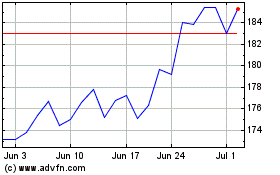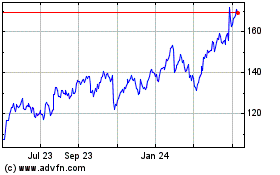By Angus Loten
Retailers more than ever are leaning on cloud computing to
capitalize on a surge in online shopping without overloading their
information-technology systems.
Sparked by the coronavirus pandemic, the upswing in e-commerce
is a boon to most cloud vendors, but especially Google's
cloud-services unit.
Google Cloud, a division of Alphabet Inc., trails far behind
front-runners Amazon.com Inc.'s Amazon Web Services and Microsoft
Corp.'s Azure, with a 6% share of the global cloud market,
according to research firm Canalys. AWS and Azure together account
for more than half the market, the firm estimates. But a strategic
focus on retail-sector services, which predates the crisis by
roughly a year, has attracted deep-pocketed customers like Wayfair
Inc. and Etsy Inc.
While the crisis has been devastating for bricks-and-mortar
sellers of nonessential goods, online sales are booming at grocery
stores, building material and garden stores, and some general
merchandise stores, according to U.S. Commerce Department data.
Mike Fisher, Etsy's chief technology officer, said the online
marketplace in February completed a lengthy migration of its IT
systems into Google Cloud, from 2,000 on-premises servers.
The company was initially drawn to Google's cloud-based search
and machine-learning capabilities as a way to boost ranking and
recommendation tools for online shoppers by inputting a wider set
of variables into smart algorithms, he said.
"We couldn't have predicted better timing," Mr. Fisher said.
Since the pandemic struck, he added, "we've doubled the amount of
data we process."
Between April and June, Etsy's revenue more than doubled to
$428.7 million from $181.1 million a year earlier, with categories
such as homewares and craft supplies among the top performers. Over
the same three-month period, online shoppers bought more than 29
million protective masks from the site's independent sellers, Etsy
said.
Similar spikes in traffic, such as on Black Friday or in the
holiday shopping season, ordinarily require millions of dollars in
additional spending on data centers and servers to provide enough
computer capacity to handle massive amounts of data processing, Mr.
Fisher said. With its IT systems in the cloud, he added, "we could
spin that up in days rather than months."
Cloud providers charge companies a negotiated rate to rent
computing capacity and applications on an as-needed basis
"Many customers are scaling beyond their wildest projections,"
said Carrie Tharp, who oversees retail and consumer strategy at
Google Cloud.
She said companies that were gradually expanding their use of
cloud services have accelerated those efforts during the pandemic.
Others came to Google for a rapid response to shifting demand, such
as curbside pickup apps, sales and inventory tracking tools, or
digital call centers.
Google in July reported a 43% rise in revenue from its
cloud-computing services over the second quarter -- slightly slower
growth than Microsoft's cloud unit, which is more than four times
its size by revenue. Though Google doesn't break out cloud revenue
data by sector, it says as of August seven of the world's largest
retailers are cloud customers.
"Google Cloud is highly focused on six core verticals, with
retail being one of them," rather than general-purpose cloud
services, said Alex Smith, senior director of channels at
Canalys.
Mr. Smith said Google has tailored its cloud services to fit the
needs of large retailers sitting on massive amounts of data,
offering cloud-based analytics tools, contact-center services and
recommendation engines -- all increasingly powered by artificial
intelligence.
But as a wave of consumers took to shopping from home, amid
lockdowns and other safety measures, most retailers simply needed
flexible computer capacity to keep up with unpredictable highs and
lows, Google's Ms. Tharp said.
"The ability to store and process vast amounts of operational
data has played a significant role in meeting sustained peak
demand" during the crisis, said Jim Miller, Wayfair's chief
technology officer.
Wayfair, an online home-decorating marketplace which reported an
84% jump in second-quarter revenue to $4.3 billion, had shifted IT
systems to Google Cloud in January, as part of a broader
hybrid-cloud strategy.
The move was aimed at supporting bursts in capacity needed for
Way Day, an annual online sales promotion in April, tapping Google
for computing power, storage, networking and other capabilities,
the company said.
"When the pandemic materialized in mid-March, online capacity
was our focus," said Hesham Fahmy, vice president of technology at
Loblaw Digital, a division of Canadian grocery store giant Loblaw
Cos.
Mr. Fahmy said the chain had migrated its e-commerce platforms
into Google Cloud before the crisis, enabling the company to scale
up rapidly. The extra computing power was needed to both process
increased online orders and fulfill them, he said.
Write to Angus Loten at angus.loten@wsj.com
(END) Dow Jones Newswires
August 24, 2020 05:44 ET (09:44 GMT)
Copyright (c) 2020 Dow Jones & Company, Inc.
Alphabet (NASDAQ:GOOGL)
Historical Stock Chart
From Mar 2024 to Apr 2024

Alphabet (NASDAQ:GOOGL)
Historical Stock Chart
From Apr 2023 to Apr 2024
